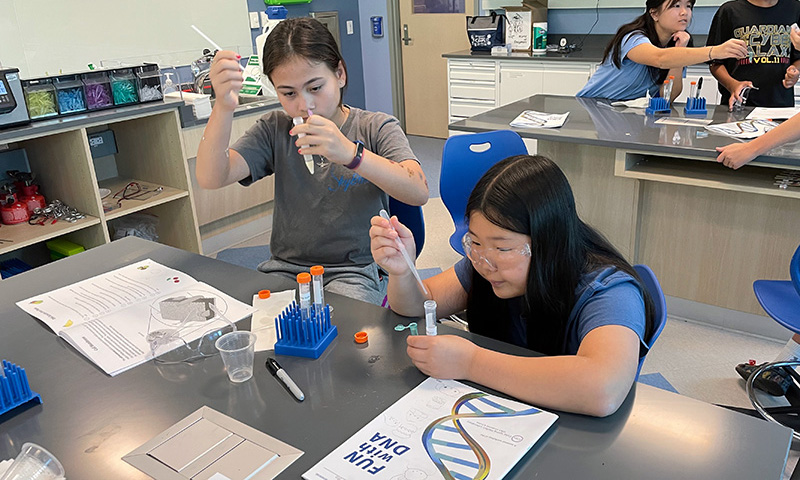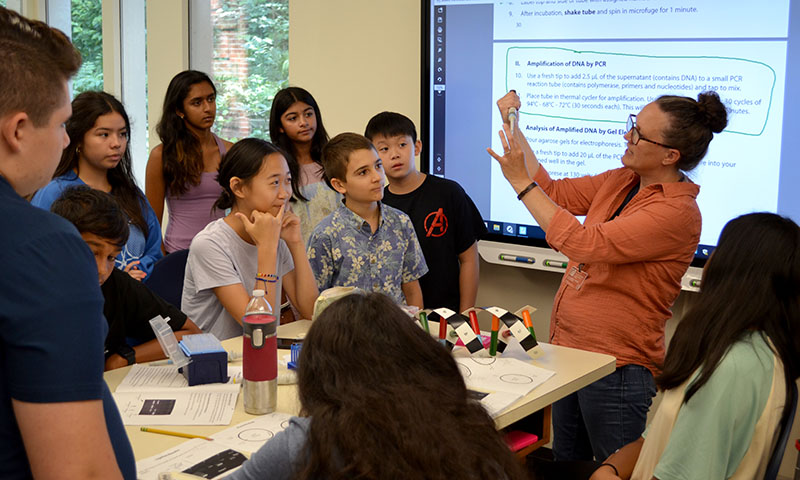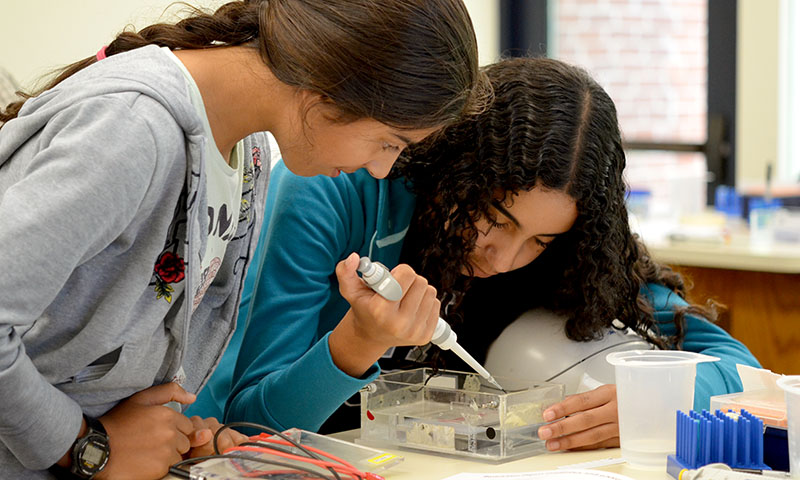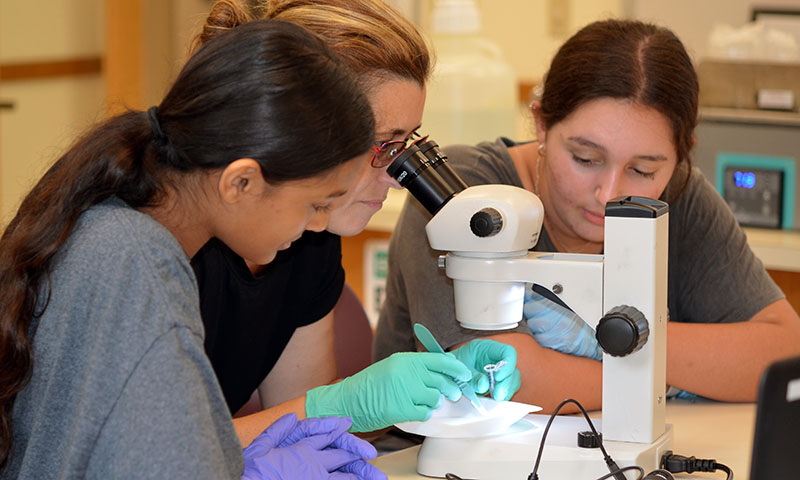
AC3 Summer Explorations
We bring to Puerto Rico world-renowned science explorations from the DNA Learning Center (DNALC) of Cold Spring Harbor Laboratory (CSHL) to immerse students in fun and engaging science learning in the laboratory.


World of Enzymes
Session One:
June 16–20, 2025
Caras con Causa, Cataño
Session Two:
June 30 to July 3, 2025
AC3, Arecibo Observatory Historic District

DNA Science
Session One:
June 2–6, 2025
UPR Arecibo, Arecibo
Session Two:
June 23–27, 2025
AC3, Arecibo Observatory Historic District

DNA Barcoding
Session One:
June 9–13, 2025
AC3, Arecibo Observatory Historic District
Session Two:
June 23–27, 2025
Caras con Causa, Cataño
Fun with DNA
Completed grades 5-8
Past event:
June 9-13 at UPR Arecibo, Arecibo
Fun with DNA s an entry-level course in DNA science. This exploration is designed especially for highly motivated students interested in expanding their knowledge of basic genetics and cell biology. Students are immersed in an environment of hands-on activities and laboratory experiments designed to increase genetic literacy, encourage critical and creative thinking, and spark interest in the field of biotechnology.
Participants will:
- construct cell and DNA models;
- use compound microscopes to view various cell types;
- extract DNA from their own cells and from plants;
- use stereo microscopes to observe mutations in fruit flies;
- genetically engineer bacteria cells with firefly genes; and
- showcase their camp work during Parent Participation Day on Friday at 2:30 p.m.
World of Enzymes
Completed grades 5-8
Past event:
- Session One:
June 16-20 at Caras con Causa, Cataño - Session Two:
June 30-July 3 at AC3, Arecibo Observatory Historic District
Developed as a sequel to the popular Fun with DNA exploration, World of Enzymes builds on basic concepts of biochemistry and molecular biology and enables students to utilize advanced techniques to manipulate DNA. Through direct observation and manipulation of enzymes, participants develop an understanding of the importance of proteins, not only in living things, but also in recombinant DNA technology, cloning, and industry.
Participants will:
- build molecular models;
- observe enzymes in action that are used for food production and healthcare;
- use enzymes to cut and splice DNA;
- analyze DNA fragments with gel electrophoresis;
- make a personal DNA fingerprint; and
- showcase their camp work during Parent Participation Day on Friday at 2:30 p.m.
DNA Science
Completed grades 9-12
Past event:
- Session One:
June 2-6 at UPR Arecibo, Arecibo - Session Two:
June 23-27 at AC3, Arecibo Observatory Historic District
The DNA Science exploration introduces high school and college students with little or no research experience in molecular genetics to the elegant tools of modern biotechnology, and is centered around laboratory work. Each experiment acts as a stepping stone for the next. Students begin with the basic techniques of DNA restriction, transformation, and isolation; then apply them to the construction and analysis of a simple recombinant.
Participants will:
- evaluate the difference between the rapid and classical method of bacterial transformation by calculating transformation efficiencies using pAMP and pKAN plasmids;
- perform a restriction analysis and gel electrophoresis; and
- digest plasmids with restriction enzymes, ligate the fragments together, then transform the recombinant-DNA, and finally perform a plasmid minipreparation of the new recombinant to identify how it originally ligated.
DNA Barcoding
Completed grades 10-12
Past event:
- Session One:
June 9-13 at AC3, Arecibo Observatory Historic District - Session Two:
June 23-27 at Caras con Causa, Cataño
Experience the process of science in this project-based exploration. A short "DNA barcode" (about 700 nucleotides in length) is a unique pattern of DNA sequence that can potentially identify any living organism. DNA barcoding projects allow students to link molecular genetics to ecology and evolution—with the potential to contribute new scientific knowledge about biodiversity, conservation biology, and human effects on the environment.
Participants will:
- extract and amplify DNA from plant and insects samples;
- use web-based bioinformatic tools to analyze DNA sequences and identify species;
- create phylogenetic trees to display genetic and evolutionary relationships; and
- use building blocks to model how polymerase chain reaction (PCR) is used to amplify DNA barcodes.
Frequently Asked Questions & Summer Exploration Activities Policies
Enrollment
- Middle school
- Completed 5th grade: Eligible for Fun with DNA
- Completed 6th grade: Eligible for World of Enzymes (Fun with DNA is a recommended prerequisite)
- High school
- Completed 9th grade: Eligible for DNA Barcoding or DNA Science
- Middle school
- Monday - Thursday: 9:30 a.m. to 2:30 p.m.
- Friday* (parent day): 9:30 a.m. to 12:00 p.m.
*Camps for week of June 30th will end on Thursday, July 3rd at 12:00 p.m.
- High school
- Monday - Thursday: 9:30 a.m. to 4:00 p.m.
- Friday: 9:30 a.m. to 2:00 p.m.
If you requested a scholarship, you should receive an acceptance letter email within 5 days after submitting BOTH a completed application AND the recommendation letter from the student’s science teacher.
Payment
- If the parent is an employee of the University of Puerto Rico, you must register with your UPR email address to receive a 20% discount.
- If you register more than one child per household, each additional child will receive a $50 discount per child.
Students requesting scholarships must have their SCIENCE teacher complete a recommendation form:
Recommendation form - ENGLISH
Recommendation form - SPANISH
Changes After Registration
During Summer Exploration
- Arecibo C3: Site of the Arecibo Observatory Historic District, Arecibo, Puerto Rico, 00612
- University of Puerto Rico, Arecibo Campus: Km. 0.8, PR-653, Arecibo, 00612
- Caras con Causa Laboratory Space: Escuela de La Comunidad Puente, PR-5 km 8.8, Palmas, Cataño

Designed and approved by the DNA Learning Center (DNALC) of Cold Spring Harbor Laboratory (CSHL), the world’s first science center devoted entirely to public genetics education and the largest provider of biotechnology instruction at the precollege level in the United States. We want all the students in our country, from public and private schools, to have the opportunity to raise their level and quality of academic training.
This material is based upon work supported by the U.S. National Science Foundation (NSF Awards ID 2321759, 2321760, and 2321761. Any opinions, findings, and conclusions or recommendations expressed in this material are those of the author(s) and do not necessarily reflect the views of the U.S. National Science Foundation.